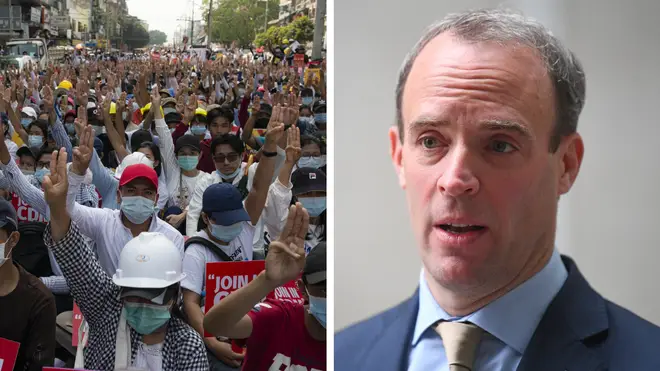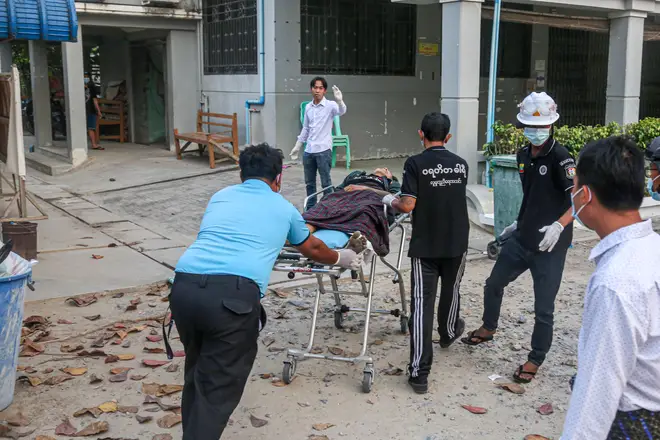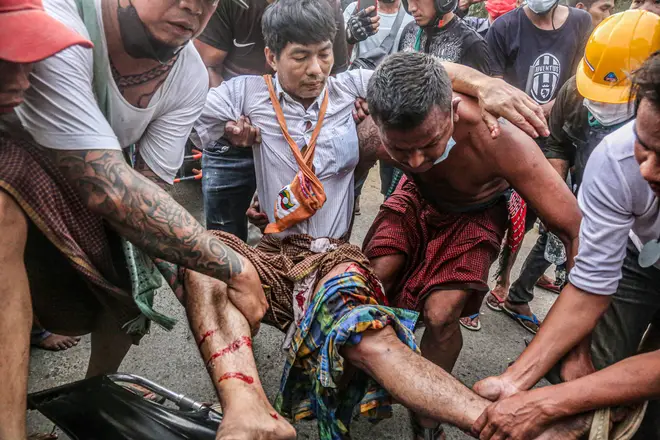
Iain Dale 7pm - 10pm
22 February 2021, 07:41

Dominic Raab will demand the military step aside in Myanmar and release the country's leader Aung San Suu Kyi in an address to the UN Human Rights Council on Monday.
The Foreign Secretary tweeted on Saturday that the UK will " consider further action, with our international partners, against those crushing democracy and choking dissent" in the country.
He said the democratic wishes of the nation should be respected, amid violent scenes over the weekend when two protesters were reportedly shot dead.
Mr Raab described the shootings as "beyond the pale" and pledged further measures on top of existing sanctions.
Demonstrators gathered across the country on Sunday, just 24 hours after police shot dead two people at a rally in the country's second-biggest city.
Read more: Boris Johnson condemns military coup in Myanmar as Aung San Suu Kyi detained
The deaths prompted a quick and strong reaction from the international community, with world leaders already condemning the toppling of the elected government under Aung San Suu Kyi by the country's top military chiefs.
"The shooting of peaceful protesters in is beyond the pale," Mr Raab tweeted, "we will consider further action, with our international partners, against those crushing democracy and choking dissent."
The shooting of peaceful protesters in Myanmar is beyond the pale. We will consider further action, with our international partners, against those crushing democracy & choking dissent.
— Dominic Raab (@DominicRaab) February 20, 2021
Britain last week froze assets of and imposed travel bans on three top Myanmar generals, adding to already existing targeted sanctions.
It is reported the two men were dock workers who were shot by security forces as they tried to force workers to load a boat.
Many industrial workers and civil servants have been taking part in a civil disobedience campaign against the junta.
It is believed the men refused to obey instructions and a scuffle broke out, prompting nearby residents to rush to the dock and help the workers resist.
Read more: Joe Biden threatens new sanctions against Myanmar following coup
One of the victims, described as a teenage boy, was shot in the head and died immediately, while another was shot in the chest and died on the way to hospital.
Several other serious injuries were also reported.
Witness accounts and photos of bullet casings indicated that the security forces used live ammunition, in addition to rubber bullets, water cannons and slingshots.

It follows violent clashes across the country in recent weeks, with several reports of military-authorised shootings - including a teenager killed by officers on February 9.
Shot two days before her 20th birthday, during a protest in the capital, Nayptitaw, she died in hospital on Friday.
Around 1,000 people in cars and bikes gathered on Sunday morning at the hospital where her body was being held.
Tight security meant even the victim's grandparents who had travelled five hours away from Yangon were denied entry.
Read more: Myanmar's military authorities block internet as coup protests expand
When her body was released, a long procession of vehicles drove to the cemetery and around 1,000 demonstrators took to the streets to mourn.
The scenes have left many people fearful of the future and are calling on powerful nations, including the UK, for assistance.
"I want to say through the media to the dictator and his associates, we are peaceful demonstrators," said protester Min Htet Naing.
"Stop the genocide! Stop using lethal weapons!"

The junta took power after detaining Ms Suu Kyi and preventing Parliament from convening, saying elections last November were tainted by voting irregularities.
Ms Suu Kyi's National League for Democracy party won by a landslide - affirmed by the country's election commission before it was replaced by the military.
Read more: Woman carries on teaching exercise class as Myanmar coup unfolds
The coup was a major setback to Myanmar's transition to democracy after 50 years of army rule, which began with a coup in 1962.
Ms Suu Kyi came to power after her party won a 2015 election, but the generals retained substantial power under the constitution, which was adopted under a military regime.
The junta said it will hold new elections in a year's time.